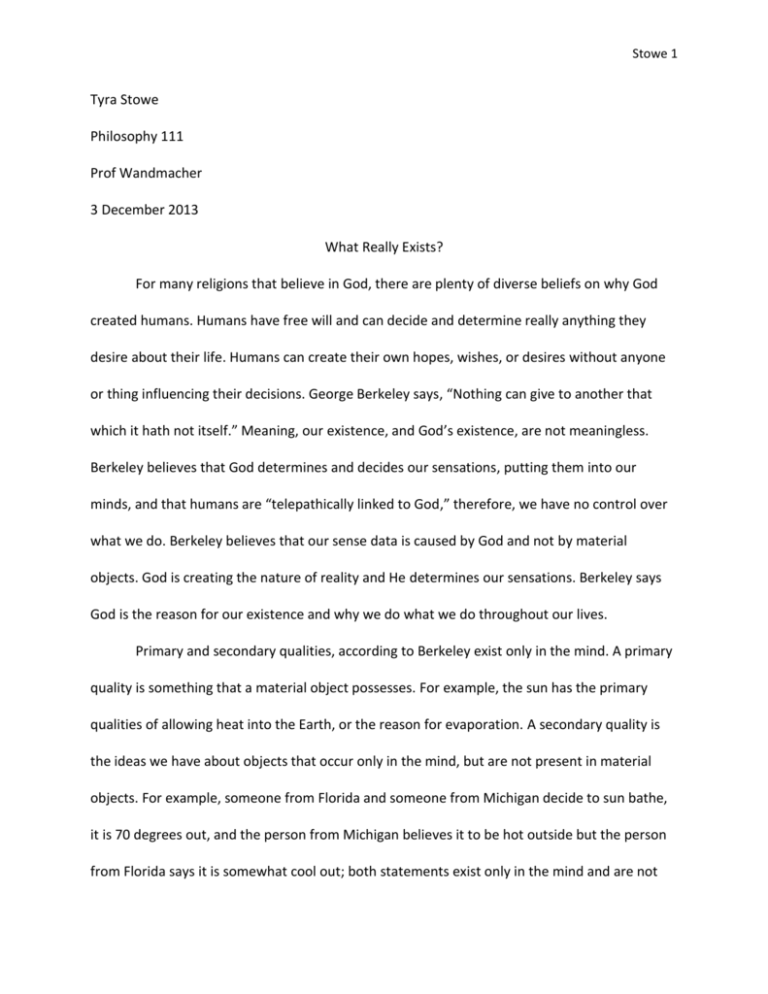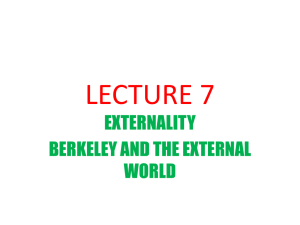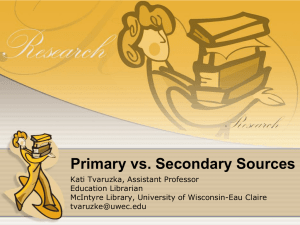File
advertisement

Stowe 1 Tyra Stowe Philosophy 111 Prof Wandmacher 3 December 2013 What Really Exists? For many religions that believe in God, there are plenty of diverse beliefs on why God created humans. Humans have free will and can decide and determine really anything they desire about their life. Humans can create their own hopes, wishes, or desires without anyone or thing influencing their decisions. George Berkeley says, “Nothing can give to another that which it hath not itself.” Meaning, our existence, and God’s existence, are not meaningless. Berkeley believes that God determines and decides our sensations, putting them into our minds, and that humans are “telepathically linked to God,” therefore, we have no control over what we do. Berkeley believes that our sense data is caused by God and not by material objects. God is creating the nature of reality and He determines our sensations. Berkeley says God is the reason for our existence and why we do what we do throughout our lives. Primary and secondary qualities, according to Berkeley exist only in the mind. A primary quality is something that a material object possesses. For example, the sun has the primary qualities of allowing heat into the Earth, or the reason for evaporation. A secondary quality is the ideas we have about objects that occur only in the mind, but are not present in material objects. For example, someone from Florida and someone from Michigan decide to sun bathe, it is 70 degrees out, and the person from Michigan believes it to be hot outside but the person from Florida says it is somewhat cool out; both statements exist only in the mind and are not Stowe 2 true to the temperature outside. The rejection Berkeley makes about there being a difference between primary and secondary qualities rejects the idea of material objects existing. Berkeley believes that no material objects exist, only ideas of them. So regardless of primary qualities being real, with objects not being material, it does not matter where they exist. This leads to Berkeley saying there is no difference between the two types of qualities. Berkeley has a thought that things exist only as long as they are being thought about. Objects stop existing when we stop thinking about them. Although, Berkeley makes a point that it is impossible to think of something not existing because then you are thinking about it, therefore allowing it to exist. Material objects are supposed to exist still, even when they are not being thought about. However, Berkeley states, material objects exist nowhere but the mind, and ideas are subsisting in the mind. This leads to phenomenalism, which reduces the talk about material objects to make talk about mental states. Phenomenalism says that sensations cannot exist without having a mind to allow them to occur. Berkeley believes that objects are just patterns of sensations. When a material thing is not being thought about, it does not exist, but because they must exist, even when they are not being thought about, Berkeley’s explanation is God. In Berkeley’s argument, it is possible for God to think of every materialistic object in the world because He is all knowing, He knows everything in the world, therefore can be consistently thinking of everything possible in the world. Berkeley believes that God perceives everything, all of the time. Therefore, every material object constantly exists. God is also the provider for everything in our minds. For example, when we are experiencing something with someone, or something someone has experienced before, God is determining the way that we may react or how we think about it. Stowe 3 Berkeley believes that God is the best explanation for our sense experience. He, God, decides how we should experience something and what we should take out of it and that we actually determine none of it, even though we have “free will.” Berkeley’s argument is that God, the allpowerful, all knowing, all mighty, is consistently thinking of all material objects, contributing in them continuously existing. God is the reason all of the experiences we have and what comes from them and our ideas of them. Looking at Berkeley’s argument it is easy for one to agree with the simplicity that he has created in just trusting that God is the cause to everything and that questioning his ideas creates skepticism and alters some people’s religion. It is clever to take Berkeley’s argument, apply it to anyone that believes in God, and tell them that if they do not believe then they are going against their own religion and beliefs and being skeptical towards the idea of their own God. Although Berkeley says that all objects are just ideas in our minds, and that the material objects do not exist, he cannot explain where the idea of God began. As previously stated, Berkeley’s argument states that anything that is not being thought about by a human is being thought about by God, which allows it to continue existing, which then explains that God created us and is always thinking about us so we continue to constantly exist. However, if that is true, how was God created? God created us and constantly perceives us, but who created God? Who perceived Him in the first place? The smell, taste, sound, etc., of an object creates its sense data which leads to our experience with the object. However, there is no record of anyone ever having sense data of God. Sure, some people think they hear God, but he is not physically speaking to them. People cannot taste God, or smell God. A person cannot stand in a room and know His physical, presence is there, so how can one go about Stowe 4 arguing that He exists, let alone he constantly perceives every material object in the world and is the reason to everything existing if there are no qualities of him in the first place? If God is the best explanation for our sense experience, why do we not have any record of sensations towards God? Assuming that God exists in order to have an argument that people are afraid to argue against, is weak. Berkeley, believing that God determines our ideas or our experiences in some ways does not make sense. Like stated in the beginning, we are humans and we have free will. We can determine our hopes, desires, etc. Berkeley argues that God determines all of that for us, but if that is the case then why do some people have such negative experiences and some have immensely positive ones. For example, someone that is so deserving of something really special to happen in their life and then their house burning down, yet the guy who just committed a dangerous crime towards others gets away with it then finds $100 on the ground. Why does that happen? Why did God decide to make someone so appreciative and loving’s house burn down, while someone that harms others have a day they don’t deserve, where positive things are happening to them throughout their day? The meaning for humans cannot be determined just from the existence of God. However, if the meaning of God is unknown and he supposedly created us, and no one has ever spoken with him or has any recollection of conversing with him, how can he be responsible for our existence? God created us, for a reason we are unaware of, but we are curious to know whom the creator of God was. For example, it is difficult to read a book and believe that the words just combine themselves on their own and made out to be a Newberry Prize winner. It is obvious the book has an author, but to who that may be, is unknown because there is no Stowe 5 record of them. Think of God as the book. If there is no author, where in the world did the book come from? There cannot just be any explanation to where those ideas came from and how they make sense. Moreover, let us say, that God really does exist; he creates all of our sensations, and is the reason for all existence. What is the explanation of sensations for people who do not believe in God? It does not make sense that God would turn people away from Himself. If He gives all sensations and ideas to people, why would he give on the sensation to not believe in his existence? There are hundreds of religions throughout the world, when Berkeley talks about God being the root of our existence, what God is he speaking about? Considering some religions have more than one God, how does that work when Berkeley explaining that God creates our sensations. If it were true that God created all human sensations and was the reason to material objects existing, it would be more logically explainable that everyone fell under the same religion. After considering, everything stated it might be simpler to say that God exists without questioning his existence and authority. However, assuming that God exists and is the reason for all existence is farfetched, especially considering He has never been sensed and no one has any record of knowing Him. The primary and secondary qualities of the world cannot explain God’s existence because there is none. With all of these factors in mind, Berkeley is wrong to say that God exists and constantly perceives everything in the world in order for them to exist too.







